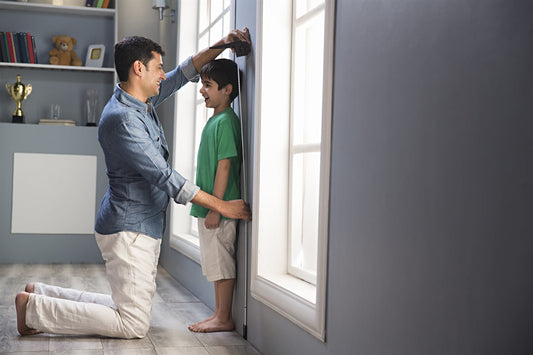Did you know that the way you behave around and with your toddler has a more significant influence on the development of cognitive, social, and emotional skills in children than anything else1?
Responsive parenting is one of the most important ways to promote healthy skill development while managing normal development behaviours.
While your toddler grows towards attaining the developmental milestones, you can also help them as a parent. Let us see how 2.3:

1-Year-Old
1. Talk to your child
Allow children to express themselves and make sure they listen to you too. It develops listening as well as language skills. You can read picture books to your toddler and talk about the illustrations.
2. Praise good behaviour
Give lots of hugs and kisses and praise them when they behave well. When the child is trying to do something, encourage and praise them through the process and not just for the result. Parents should also be ready to say no when required.
3. Encouraging eye contact
Parents need to make eye contact with their children and make them understand non-verbal communication through eye expressions. Parents should also encourage children to make eye contact.
4. Encourage art
Give your child crayons. Show them how to draw lines and circles. Not only does it help develop fine motor skills, but it also teaches kids to express themselves through different mediums.
2-Year-Old
1. Describe emotions
Use words that describe feelings and emotions. While you are playing, you can say, “We are happy when we play together”. Children should be familiarised with their feelings, and they should know how to express themselves.
2. Play with puzzles
Help your child with puzzles and play games with them related to identifying shapes, colours, and body parts. Hide things and ask them to find them.
3. Encourage words
Kids learn to point at things when they are just babies, but as they grow, they need to learn to call out names of things and people rather than point at them. So, ask your child to use words when they want something. Prompt them by suggesting the first sounds. For example, if they want milk, you can prompt by making the “m” sound.
4. Create a positive learning environment
Once toddlers start to walk, they can find themselves in places they had never seen before, even in the house. This new world can be surprising and scary at times, so make the house a positive learning space for your child. Declutter the place, remove dangerous objects and make it comfortable.
3-Year-Old
1. Encourage empathy
Encourage your child to hug and play with other kids their age. Provide them with toys and encourage them to share them. Comfort them if they have trouble waiting for their turn and help them get involved in something else in the meantime.
2. Problem-solving
Encourage your child to try to solve their problems on their own in a peaceful way. Sometimes kids don’t know the problem themselves, so it’s crucial to help them understand it and find a solution.
3. Self-discipline
Children lack self-control and want what they want whenever they want it. Though we often let it go thinking they are kids, it’s important to teach them self-discipline. To facilitate this, make a routine and set rules. If they break the rules, give them a one-minute time out but avoid scolding or yelling.
4. Concept of personal space
Toddlers are curious about everything and can often touch, lick, hug anything without any concern for what it is or who it belongs to. It is important to teach them that some things are off-limits. Visual cues and actions work best for kids, so you can play games about staying in a particular area. You can also ask them to spin in a circle with their arms outstretched. Tell them that the space within the circle is theirs.
4-Year-Old
1. Encourage the habit of sharing
When your toddler is with other kids, stand aside and observe whether they let others play with their toys. At this age, your child probably has a strong sense of ‘my things’. Hence, you must encourage them to let others play with the toys. After a point in time, they won’t mind sharing.
2. Being cooperative
Children need to understand that everything can’t go according to their wishes. There’ll be times when they’ll be required to cooperate with you or their peers. One way to develop this skill would be to encourage your child to participate in team games. This will help them learn to cooperate with others to win the game.
3. Following social rules
At this age, it’s difficult for your child to behave according to the social rules like greeting elders, responding if someone’s questioning them, etc. So, whenever such a situation arises, prompt your child with something like “say hello to uncle.”
5-Year-Old
1. Right Vs Wrong
If you scold or praise your kid, their perception of right and wrong is often influenced by your reaction. As a result, this is a good way to educate your child about what's wrong and what's right in various social contexts, such as discouraging them from pushing a friend to get ahead in line.
2. Accepting failure
Children tend to have extreme emotional reactions like throwing toys or not talking when they don’t win a game. It would help if you made them understand that losing is a part of life. Shift their focus to how they can improve to win next time.
3. Listening skills
Encourage your child to listen and pay attention when someone’s talking to them. This will also help your child to have more meaningful conversations.
6-Year-Old
1. Understanding body language
Body posture, facial expressions, movement of hands and legs, etc., play a huge role in social ethics. Enact different body language situations and ask them to guess what you are ‘feeling’. For example, if you turn your face and body away from them, it probably means you are not interested in playing, and therefore, they shouldn’t force you to play.
2.Social courtesies
Teach your child to say ‘‘I’m sorry” if they mistakenly hurt someone or “thank you” while receiving a gift. Prompting works well in this case too. After some time, it’ll become a social habit.
3. Having a meaningful conversation
Listening plays a major role in holding a conversation. Every day, you can choose a topic to have a long conversation with your child. Encourage them to listen, think and come up with a response to what you say. If they start wavering from the topic, bring their focus back to the topic.

Research shows that 90%4 of brain development happens by the age of 6, which makes this time very important for your child. Though these activities may help your child learn social and emotional skills, it’s only one-half of it. Proper nutrition plays a vital role in a child’s physical and cognitive development. Junior Horlicks can help here since it contains nutrients like choline, iron, and iodine, which are known to support brain development and calcium, Vitamin D, Vitamin K & protein, which support physical growth development. It also contains nutrients such as Vitamin E, A, Selenium & copper to support healthy immune function.







